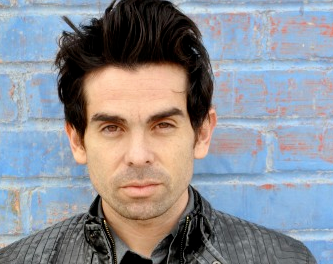Because the Sinless Savior Died...
And it always comes back to because the sinless Savior died... It must come back to the cross. It must retain its central place- primary, of first importance. It cannot be displaced to the peripheral. It cannot be shifted even in the slightest degree. It cannot be moved even in the least by any other insights that come to take on far too much attention. We simply cannot take our gaze off it, nor let our eyes ever drift away from it. We cannot move away from it. We cannot move on from it. We can only ever strive to move nearer, to search closer, to inquire further. It is that blazing fire at which the flame of our love is kindled. We must draw near to that fire ever and always. We must stay close. Otherwise we will become cold- our affections cooled, our passion diminished, our hearts complacent, our focus distorted, and our Christianity nominal. We must, not simply because of it, but because of Him who hung on it. In our place condemned he stood. It was because of our transgressions Christ was wounded, for our iniquities he was crushed. It was because of our sin that he was so marred beyond human semblance. Why is the cross that central element of the gospel that cannot be forfeited even in the smallest degree? Because when we behold the disfigurement of the Son of God, when we find ourselves appalled by his marred appearance, when we see his languid eyes meet ours, we need to reckon afresh that it is upon ourselves we gaze, for he stood in our place.
It is this news, this good news, this amazing news, the news of salvation, the news of Christ and him crucified that fans into flame radical sacrificial, sold-out, supremely satisfied, crazy love for God. And it is with this that God is most glorified. Because it is with this that we are most satisfied in Him. Because when we sit next to the holy flame of God’s grace on the cross, we see God’s unfathomable love for us and are set ablaze by it. It is as this grips us, as this burns within us, we become holy torches. That everything we touch, everything we do, and every person we interact with may also be lit by our fire. And then they burn. And the fire spreads. And as it does that great glacier, this cold world itself begins to melt.
Why God Should Be Questioning Us
We say, "Well, everyone wants what's best for them." And I'd agree. However, we are so quick to think we know what's best for us better than anyone. We forget that surely an omniscient God must know us better than ourselves, he would not be omniscient otherwise. And for Him to know us better than ourselves, he must know what's best for us better than ourselves, if indeed He is to be good and all-wise as well as omniscient. Therefore, even by pure reason we can be sure that God does indeed know us better than ourselves. Far better. In fact, God knows us and what is best for us to such an intimate extent that for us to question Him is but to claim our place as fools. Yet we constantly do this. We look at circumstances God has permitted in our lives and immediately jump to the conclusion that He couldn't possibly have wanted them to happen to us. Why? Well, because we wouldn't have allowed them to happen to us. We assume that what God thinks is best for us and what we think is best for us are equivalent. But couldn't the simple fact that what happens to us isn't always what we want to happen to us be an obvious indicator that they aren't the same? To think that for some reason God does allow things to happen to us for our good, even when we don't think so? It seems the real reason why we wouldn't have allowed certain things to happen to us, and thus question God why he would (or did), is ultimately because we think we know what's best for us even better than God does.
It is at this point we must remember who we are, and who God is. We must remember our place. Who are we to question Him? Who are we, finite, imperfect, and simple-minded man, to question the infinite, perfect, and all-wise God? Are we not but here today and gone tomorrow? And is He not eternal, having been forever? Is it our place to question such a One? Should we even be allowed to? No, we should cover our mouths and hide our faces in the dust. This is our place before a Holy God. If anyone is to be doing the questioning, it should be God. If anyone is to give an account of themselves, it should be us. In all reality, when what happens to us does not agree with what we see as in our best interests we should not question God in his apparent display of carelessness, but we should question ourselves in our outright display of doubt. The problem is not with God's apparent lack of concern, but our obvious lack of trust. This is the real problem. It is with ourselves.
A Prayer of Questions About His Church
Why do you allow your church to falter? Why does it seem so weak at times? Why is there such a lack of discernment? Why is sanctification so slow? Lord, how long will you tolerate the mediocrity that sits in the pew? Lord, how long will you put up with your children who are ashamed and unlearned to speak of your name to the unbelieving? Why do you permit your shepherds to starve the sheep instead of feeding them? Father, I don't understand. There is so much wrong with your church and to my limited mind it seems like you are slow to act. But I know that nothing escapes your eyes, Father. And to the outsider it may seem that you are complacent towards a church that is filled with hypocrisy and lethargy. But being complacent and patient are not the same thing. You are patient with us even though we don't deserve it. We are forgiven in Christ and the more we sin the more we become aware of the magnititude of your grace. Perhaps that is why you allow us to fail daily--that your grace might be magnified. Lord, my mind cannot grasp your ways. My thoughts are so small. They are so fixed on the temporal that I cannot always see your eternal purposes in the affairs of mankind. I cannot tell whether your people are growing in the word or shrinking in the world. In one moment they have victory over sin and the next they wallow in it. In one moment they are willing to suffer for the sake of Your Son, the next they prefer comfort over conformity to His image. Pondering these things is enough to drive one to insanity at times. Yet your wisdom reigns over all. You are in complete control. You are accomplishing your will. You are glorifying yourself and all of history leads to this great end. It's just that in painful moments we cannot always see this end in sight. Lord, let me rest in your wisdom. Your church is in your hands, not mine. The church is your idea, not mine. The church is your gift to your Son, not mine. The church is yours to sanctify, not mine. It is yours to save, not mine. Remove the self-imposed burden of thinking that it's my job only to ensure the health of the church. Lord, I am but a clay vessel in your pantry and if you see fit to put me on the shelf or if you see fit to use me everyday, Lord it is your choice. Let me be only a clean vessel. Christ Jesus, you are building the church and the gates of hell cannot prevail against it. Let me rest on the promise of your sure and unchanging word. This I pray in the marvelous, powerful name of Jesus. Amen.
WORD OF THE WEEK #3: Regeneration
There is a modern-day sense in which the word regeneration is used. If you cut off a lizard's tail it may regenerate. In this sense we would say that the tail grew back to fulness. Once a man tried to use this definition to explain to me that regeneration was the process by which God makes us more like Chirst. In other words, he was saying that regeneration is the same thing as growing in godliness. I begged to differ and told him that regeneration was something different than what he described to me. What he was describing was sanctification.
The root word of regeneration is generation. In a family there are often two, three or four generations alive at one time. Generation has to do with birth, life. One generation generates or gives life to another. Regeneration, in scripture, is the term we use to say that we have been "born again." Both mean the same things. REGENERATION = BORN AGAIN. John 1:12-13 tells us that we are born into God's family at the will of God, not our will: But to all who did receive him, who believed in his name, he gave the right to become children of God, who were born, not of blood nor of the will of the flesh nor of the will of man, but of God.
This is hard for some to grasp because mankind can feel as if this is imposing on the will of man or that man has no will in his coming to faith in Christ. The problem from grasping this stems from a lack of understanding the order of salvation and defintion of terms. Being born again or regeneration comes before faith. Faith in Christ then is the fruit of regeneration. We do not cry out to God and say, "Make me born again, regenerate me!" We are regenerated, given life, made to live spiritually....then we cry out to God and say, "Lord, save me by Christ." Regeneration and salvation, while heavily connected, are not exactly the same thing.
It is much like the baby that is born into this world. It was not their decision to have life. Their parents willed it, so to speak. The same is true of our God. He willed our spiritual life (John 1:12-13, John 3:1-15). When a baby is born into this world, the first thing is dies is cry for help. That is what happens to us when we are given spiritual life from God--immediately we cry out to God for help, for salvation.
When you read 1 John 5:4-5 you will see that everyone that has been born of God (regenerated) overcomes the world. It is not saying that when you overcome the world, you will be born again. That is like saying that your deeds, your good works, your law-keeping is what grants you life. That is not true. If that is true, then our deeds give us life, not God. We are given life, we are born again by God and then we, by God's strength, overcome the world. Overcoming the world is the fruit or result of being born of God. Life comes first, then victory over the world.
Now back up to 1 John 5:1. Scripture says "everyone who believes that Jesus is the Christ has been born of God, and everyone who loves the Father loves whoever has been born of him." John expresses a different truth in the exact same way. Whoever has faith in Christ HAS BEEN born of God--that's past tense. It is not saying that whoever believes in Christ will be born again. It says that they HAVE BEEN born again. The being born of God or regeneration comes first. Faith then is the fruit or result of being born again. The order of salvation then looks like this. God causes us to be born again or gives us spiritual life (regeneration). Once we are alive we put faith in Christ and then are saved. That is no way violates the will of man. Man freely puts faith in Christ but cannot until God gives him life and cannot until God gives Him faith and repentance. The natural man cannot understand the things of God. He cannot. No ifs, ands or buts about it. The things of God are spiritually discerned or understood. He must be given spiritual life first in order to grasp scripture in a way that leads to salvation.
Titus 3:4-7 clearly shows us the wonderful truth of how God regenerates and then saves us.
Titus 3:4-7 But when the goodness and loving kindness of God our Savior appeared, 5 he saved us, not because of works done by us in righteousness, but according to his own mercy, by the washing of regeneration and renewal of the Holy Spirit, 6 whom he poured out on us richly through Jesus Christ our Savior, 7 so that being justified by his grace we might become heirs according to the hope of eternal life.
Notice that we are not saved by works. We are saved by the "washing of regeneration and renewal of the Holy Spirit." We are saved because we were first born again or regenerated by the Holy Spirit. The Holy Spirit gives us life. And He does not give life apart from the Word of God that He inspired. Therefore, it is most necessary for us, as God's mouthpieces, to share the Word of God abundantly with those who are dead in sin. God will not regenerate them apart from His Word. The same Word which called dead Lazarus from the tomb will call dead sinners to life so that they can believe in Christ and be saved.
The practical applications of this truth are anything by heady. They are not meant to fill our brains with information only. They are meant to fill our minds with knowledge that leads us taking joy and delight in our God. These truths humble us and show our dependence upon God for eternal life. They help us to live a life of gratitude and worship of God. They help us to realize that God who has begun a good work in us will be faithful to complete it...our salvation is secure because it is God who gave us life and faith in Christ. These truths show us that if God had not acted first towards us and regenerated us, then we would still be dead in our trespasses and on our way to hell for our disobedience towards God. These truths show us that if we do not rightly learn the Word of God and do not rightly share the Word of God, then mankind has no hope of being born again to faith in Christ. How serious it is then that you sit under the Scripture and those who teach it faithfully and correctly.
I love the truth and WORDS of God's Word because they cause me to be awestruck by our good and gracious God.
America's Financial Meltdown
In a recent book by Pastor Mark Dever, he quotes the writings of Jonathan Edwards and in so doing examines the way the world responds to loss and implies the way believers are to respond to tragedy, loss and dire times. He references the Old Testament book of Job to make his case.
"In 1723, a young pastor of a church in Manhattan, Jonathan Edwards, preached a sermon called "The Nakedness of Job." He described wealthy Job's sudden losses, which included even the lives of his children. And then he turned to how we ought to respond to such losses in contrast to how the world responds."
'Perhaps, when you read the history of Job, you read it as a strange thing that happened but once in the world; but, for the time to come, read it as a think thing that happens daily, and frequently, for every man at death is as much deprived of all his worldly goods as Job was...The history of Job is only a shadow of death; it is no more than happens to every man in the world...Such is the folly of the world. They pursue violently after the world, slave and tire themselves for a little of it, are exceeding anxious and careful about it. Their minds are gnawn with care and anxiety; they undergo abundance of difficulties for it, and will often violate their consciences, disobey their God, and go very near hellfire--so near as to scorch them--come so near to the pit that their feet are every moment ready to slip. When they lose the world, they mourn as if they had met with a loss that it is impossible should be repaired, either in this world or the next, and when they have got a little of the world, they please themselves with the thoughts of it as much as if they were sure they could never lose it, neither by death nor otherwise...Before, they were careless and at ease, as if death were not wont to come into their parts of the world.'
Death, loss, decay are all part of life for believers and unbelievers. That is why scripture counsels us to NOT lay up treasure here on earth. If we are to joyfully meet this world head on with its current crisis and defeat satanic deception of security in goods, our treasure must be God, as was the case with Job. If our treasure is earthly, we will surely panic, become depressed and even bitter towards God and thus reveal our idolatry--that we loved things more than the One who gave things to us.
Let the current economic crisis be used of God to reveal your current affection or lack of it for God. Realize this is the grace of God in action working out your sanctification. And as tough as it is, in the midst of pain, give thanks to the Lord for His mercy and goodness endures forever.
WORD OF THE WEEK #2: Justification
You may recognize that the word justification looks much like the word justify. We use it all the time. Oftentimes when someone does wrong and they are caught they try to justify their actions. In our modern day usage of the word, it carries the idea of trying to explain one's action so as not to be guilty.
In scripture the greek word for justify is dikaiovw. It can mean:
1. to render righteous or such he ought to be
2. to show, exhibit, evince, one to be righteous, such as he is and wishes himself to be considered
3. to declare, pronounce, one to be just, righteous, or such as he ought to be
Whoever God predestines to salvation, He will call to salvation. Those whom God calls to salvation, He has justified. The reality is so secure that even the past tense of the word is used in Romans 8:30. It is not that God is going to justify us. We are justified. We are declared just or righteous.
Romans 8:30 And those whom he predestined he also called, and those whom he called he also justified, and those whom he justified he also glorified.
Romans 3:20 For by works of the law no human being will be justified in his sight, since through the law comes knowledge of sin.
Galatians 2:16 Yet we know that a person is not justified by works of the law but through faith in Jesus Christ, so we also have believed in Christ Jesus, in order to be justified by faith in Christ and not by works of the law, because by works of the law no one will be justified.
Romans 5:1 Therefore, since we have been justified by faith, we have peace with God through our Lord Jesus Christ.
In Romans 10:10, Paul says also that we are justified as we believe with our heart. In other words, belief in Christ and faith in Christ are synomous for both result in justification.
Romans 10:10 For with the heart one believes and is justified, and with the mouth one confesses and is saved.
The practical and personal applications of understanding justification are numerous. It keeps us humble knowing that it is God who justifies us, not our own seemingly good deeds. Justification also leads us to delight in and worship God for His kindness to us in Christ Jesus. Justification also causes us to hate the sins for which we've been declared righteous. Lastly, understanding justification rightly causes a deep compassion to well up inside of us for the unjustified, the sinner, the condemned.
Thank the Lord for declaring you righteous instead of declaring you guilty!
Dangerous Prayer
Are you able to drink the Cup He drank?
*The Cup and the Glory, Greg Harris
Living In The Way Of Jesus
If an atheist lives in the way of Jesus, why sould he go to hell? He followed in the way of Christ. He did the things Jesus commanded and modeled his life after Christ. Jesus didn't come to bring us facts about God. He came to help us live a way of life. And if an atheist lives in a way that displays Christ's character, how could God condemn him for not believing certain facts about Jesus?Ah, well, here's the problem with that sort of argument. If Jesus came only to be our model, our example, our example setter, then we are all damned. We are all doomed and condemned if that is only what Christ came to do for us. Why? Because we do not all perfectly follow the life of Jesus. We fall short of His glory.
Following Jesus' example as a way of salvation is dangerous. It is the same thing as trying to earn salvation by keeping the Law of God. Let me put it to you in syllogistic fashion:
If the Law of God = Reflection of Christ's Character = Living in the way of Christ
And if not perfectly obeying the Law of God = condemnation
Then not perfectly living in the way of Christ = condemnation
Following the example of Christ or living in the way of Christ as a means of salvation is nothing other than Lawkeeping. That is pure Pharisaism or legalism. That is saying that the Law = Gospel or Law = Salvation. That is a false gospel and only leads to judgment from God. The emerging church leaders that claim that anyone who lives in the way of Jesus is saved, is sorely mistaken.
Salvation has taken place when a person obeys the gospel. That is, they turn from sin and turn to God for salvation through the death, burial and resurrection of Christ who perfectly kept the Law of God for you. Any person who simply attempts to live in the way of Christ and yet does not believe the truth of Christ and what He has done to bring us to God is not saved.
Please, please, please do not be undiscerning in what you read from others. Just because someone puts out a book and has a large following does not mean they are orthodox. False prophets and teachers have always existed. Let we be deceived by them, lest us examine the Scripture and then examine their writings by the Word. The point of being a pastor is not to bring contemporariness to the church. The point is to faithful administer the Word of God for His glory displayed in Jesus Christ our Savior.
QUOTE OF THE WEEK: JOHN PIPER
Do we love God? That is the point of the test. Do we cherish Him and the merciful wisdom of His painful purpose more that we cherish pain-free lives? That is the point of God's testing.
Our trials reveal the measure of our affection for this earth--both its good things and bad things. Our troubles expose our latent idolatry.
For those who believe that God rules purposefully and wisely over all things, our response to loss is a signal of how much idolatry is in our souls. Do we really treasure what we have lost more than God and His wisdom? If we find ourselves excessively angry or resentful or bitter, it may well show that we love God less that what we lost. This is a very precious discovery, because it enables us to repent and seek to cherish Christ as we ought, rather than being deceived into thinking all is well.
Open Theism is wrong. God plans everything for His glory and our joy in Him.
Word Of The Week: Glorification
GLORIFICATION
The word glorification is a form of the word glorify. We know that we are to glorify God. That is, we are to make much of him. We are to honor, display and proclaim His worth and excellence. The Greek word for this is doxazo. So when scripture refers to God glorifying us, does it mean the same thing? Is God worshipping us? Of course not. The word doxazo has several possible meanings.
Doxazo can mean:
1. to think, suppose, be of opinion
2. to praise, extol, magnify, celebrate
3. to honour, do honour to, hold in honour
4. to make glorious, adorn with lustre, clothe with splendour
a. to impart glory to something, render it excellent
b. to make renowned, render illustrious
(1). to cause the dignity and worth of some person or thing to become manifest and acknowledged
In order to choose the proper definition (1-4) we must let the context determine the meaning. In Romans 8:28-30 we see the word glorified used at the very end .
Romans 8:28-30 And we know that for those who love God all things work together for good, for those who are called according to his purpose. 29 For those whom he foreknew he also predestined to be conformed to the image of his Son, in order that he might be the firstborn among many brothers. 30 And those whom he predestined he also called, and those whom he called he also justified, and those whom he justified he also glorified.
Notice a couple of things. God predestined us to be conformed to the image of his Son. In other words, God predetermined that His children would be transformed to look like Christ. If you observe the path that God has predetermined for us, it will end in us looking like Christ, who is glorious.
In verse 30 we see Paul laying out the order of salvation. He predestines us to look like Christ. In order to achieve this result He must call us to turn from sin and turn to Christ. Having turned from sin to faith in Christ, God justifies us or pronounces us righteous because of the righteousness of Christ. Although Paul does not mention it here, there is another thing that God does for us inbetween justification and glorification. God sanctifies us. That is, He is making us experientially, day-to-day, more like Christ. One day He will glorify us.
Glorification then is the end result of all that God does for us in salvation. It is when we are fully conformed to the image of His Son. His predestination of us will finally come to the destination--which is glorification. Simply put it is when God adorns us with our new bodies that will live eternally. He will clothe us with the splendor of Christ. He will remove all our desires to sin. He will render us excellent. This is something that God does for us. This is one of the great gifts of the gospel. 1 Corinthians 15:50-55 describes this further.
1 Corinthians 15:50-55 I tell you this, brothers: flesh and blood cannot inherit the kingdom of God, nor does the perishable inherit the imperishable. 51 Behold! I tell you a mystery. We shall not all sleep, but we shall all be changed, 52 in a moment, in the twinkling of an eye, at the last trumpet. For the trumpet will sound, and the dead will be raised imperishable, and we shall be changed. 53 For this perishable body must put on the imperishable, and this mortal body must put on immortality. 54 When the perishable puts on the imperishable, and the mortal puts on immortality, then shall come to pass the saying that is written:
“Death is swallowed up in victory.”
55 “O death, where is your victory?
O death, where is your sting?”
When Christ comes again to judge the living and the dead, this transformatin will take place. Believers who have died will be raised and glorified as well as those of us that are alive and waiting for Messiah to return.
Does this truth have any practical application for our lives? Indeed it does. It leads us to greater love for God and His future goodness to us. It also guards us from being decieved by false teachers who claim that Christ has already come the second time. If you still feel pain, still have sinful desires in your body, still get tired, then be assured that Christ has not come. Because when He comes He will glorify the Father's children.
We serve a great God. That He would glorify us one day is simply amazing to ponder. There is no god like our God!
What's So Golden About The Golden Rule?
Matthew 7:12 “So whatever you wish that others would do to you, do also to them, for this is the Law and the Prophets.
1. We See The Law Which Shows Us Our Loving God
One of the reasons God gave us the Ten Commandments, the Law, was to reveal God’s holiness and perfection. It is the standard of His righteousness and glory. And when we compare ourselves to His righteousness and glory as revealed in the Law, we see that we fall short of that glory. The Law shows us God and so does this Golden Rule--the Golden Law. It shows us that God has a high standard of love for others. God loves others. He loves us. He blesses us. He gives to us. And because this rule came from the mouth of Jesus, it teaches us about the nature of our Father. How wonderful our Father is.
2. We See The Law Which Sums Up The Old Testament
When Jesus says that all of the Law and Prophets are summed up in the Golden Rule, He means the moral Law. He does not mean everything the prophets said. The prophets spoke of the history of Israel and we cannot know that from the Golden Rule. The prophets foretold of coming destruction to unbelieving nations. We cannot know that through the Golden Rule. The prophets spoke of creation and we cannot know that in the Golden Rule. So when Jesus give us this rule that sums up the Law and Prophets, He must mean the rules for living they gave…the moral commands…the moral commands that show us the nature and holiness and righteousness and glory of God.
Now since the Old Testament is all about Christ and since the Law of God is all a reflection of God’s nature, then it must be that this golden command paints a wonderful portrait of Christ who is the perfect image of God. In other words, the commands, the Law and Prophets are writings that tell us of Jesus. So when Jesus speaks the Golden Rule, He is reinforcing the Old Testament, which reinforces that He is speaking about Himself, which reinforces that He came to show us the Father and bring us to salvation in order that we might be with Him.
Do you see how loving our Father is? He desires that we know Him. And so He is saying to us, “The Law and Prophets are about Christ…and this command sums up the Law and Prophets, and so this command tells us about Christ who is the image of the Father.
3. We See The Law Which Shows Us Our Sin
We must see this Golden Rule for what it is. It is Law. It is a command. Why did God give us the Law? Why did God give us commands?
Romans 3:20 For by works of the law no human being will be justified in his sight, since through the law comes knowledge of sin.
Seeing the Golden Rule for what it is, we then know that it has a certain function in the life of the sinner. It is to show the world their gross sin and hold them guilty before God without excuse.
Romans 3:19 Now we know that whatever the law says it speaks to those who are under the law, so that every mouth may be stopped, and the whole world may be held accountable to God.
Romans 2:15 They show that the work of the law is written on their hearts, while their conscience also bears witness, and their conflicting thoughts accuse or even excuse them.
May I encourage you to do this: when you are busy witnessing to others, use this very command to show them just how bad of a sinner they are. Let the command be a light to expose their darkness and wickedness. Now although this Golden Rules show us our filth and sin and condemnation before God, it also shows us our need for the Savior.
4. We See The Law Which Shows Us The Need For The Savior
One of the amazing thing about Scripture is that the Law reveals to us Christ’s nature in the form of commands. But Scripture also pits the Law and Christ against each other in certain ways.
Galatians 2:16 yet we know that a person is not justified by works of the law but through faith in Jesus Christ, so we also have believed in Christ Jesus, in order to be justified by faith in Christ and not by works of the law, because by works of the law no one will be justified.
The Law is not bad, for it shows us Christ. We are bad for not being like Christ. We stand condemned before God and need Christ to save us from our inability to be like Him. And so God says, instead of trying to earn salvation by being like Christ or obeying the Law, instead, trust in Christ.
Galatians 3:24 So then, the law was our guardian until Christ came, in order that we might be justified by faith.
1 Timothy 1:8-11 Now we know that the law is good, if one uses it lawfully, 9 understanding this, that the law is not laid down for the just but for the lawless and disobedient, for the ungodly and sinners, for the unholy and profane, for those who strike their fathers and mothers, for murderers, 10 the sexually immoral, men who practice homosexuality, enslavers, liars, perjurers, and whatever else is contrary to sound doctrine, 11 in accordance with the gospel of the glory of the blessed God with which I have been entrusted.
1 Timothy 1:15-17 The saying is trustworthy and deserving of full acceptance, that Christ Jesus came into the world to save sinners, of whom I am the foremost. 16 But I received mercy for this reason, that in me, as the foremost, Jesus Christ might display his perfect patience as an example to those who were to believe in him for eternal life. 17 To the King of ages, immortal, invisible, the only God, be honor and glory forever and ever. Amen.
And for those of us that believe that Christ died in our place, was buried and rose again the third day, we have the promise of life with God who dwells in us by His Spirit. As God’s children, we are being transformed to look more and more like Christ. This means that as God’s children, we are being transformed into people who are getting better at keeping the Law which displays the glory of God in Christ. So that is why Christ gives this command to us to obey. For the sinner it condemns…for God’s children it displays the glory of the Father.
5. We See The Law Which Shows Us Our Duty
The statement is not, “Do to others what they want you to do to them?” That is not the same things as “Do to others as you would want them to do to you?” The statement is not “Do not do to others what you would not want them to do you.” That is actually how various religious had promoted this rule before Jesus came teaching at preaching. It was in the form of a negative. Do not do to them what you would not want them to do to you. Jesus transformed this and said, “Do to others as you would want them to do to you?” There is a world of difference. You can obey one by simply never interacting with people. Jesus’ rule demands that we interact with others and not look the other way when they are in need.
And so I present to you a few examples of how you can perform this duty towards others and display God’s glory. When you wrong others, don’t you want them to forgive you? Then forgive them. When you are hurting financially, don’t you wish others would give to you? Then give to others. If you were dying and going to hell, wouldn’t you want someone to tell you of Christ who saves? Then tell others. Don’t you wish your parents had taught you more of Christ and disciplined you better? Then do that for your children.
You see, to not do these things, is to disobey Christ. To not do these things is to be a Pharisee who loves to practice religion but not to the point where it affects your actions towards those in the church and those outside. You can’t obey this command if you aren’t witnessing, if you aren’t parenting right, if you aren’t giving, if you are forgiving, if you aren’t gentle with your speech, if you aren’t helpful, if you aren’t patient. Obedience to this command requires actively doing good. And to know what is good to do and not do it, according to Scripture is sin. So go out today and sin no more.
Now this is why the Golden Rule is so golden. It shows us the nature of God. It sums up the Old Testament of Christ. It shows us our sin. It shows us our need for the Savior. It shows us our duty to display the glory of God in obeying the command.















